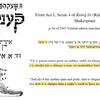7: Excerpt (with transliteration and English translation) and cover illustration, William Shakespeare’s "King Lear," translated into Yiddish by A. Asen, 1947.
Towards the beginning of Part One of Angels in America, Louis gets into a conversation with the rabbi who has just eulogized his grandmother. He tells Rabbi Chemelwitz that he has not visited his grandmother in years, and the rabbi replies in Yiddish, “Sharfer vi di tson fun a shlang is an umdankver kind.” Louis doesn’t speak Yiddish and asks the rabbi to translate, and Rabbi Chemelwitz replies: “How sharper than a serpent’s tooth it is to have a thankless child. Source: Shakespeare, King Lear.”
As scholar Joel Berkowitz has written in his book Shakespeare on the American Yiddish Stage (University of Iowa Press, 2002), Shakespeare’s plays in Yiddish translation “became embedded in the consciousness of America’s Yiddish-speaking Jews, for they helped audiences come to terms with the challenges of immigrant life” (209). In addition to direct translations of Shakespearean plays, like the Yiddish version of King Lear that Rabbi Chemelwitz is quoting, there were also dozens of adaptations of Shakespeare’s plays (like The Jewish King Lear) that put the characters and plots of his plays into an American Jewish immigrant context.
Suggested Activity: Show students the image and excerpt from King Lear in Yiddish. You might ask them to compare the given English translation to the same line from the original Shakespeare. What, if anything, is different?
Then, ask students to discuss the following questions in small groups: what might have been Asen’s intent in publishing this translation? Why do you think plays like King Lear in Yiddish were so popular among newly-arrived American immigrant audiences? What is the function of Rabbi Chemelwitz referencing King Lear in Angels in America – and specifically, of him referencing it in Yiddish?
Source: William Shakespeare, King Lear (Kenig lir), trans. A. Asen (New York: A. Asen, 1947), 3, 64.

